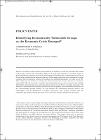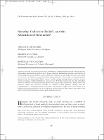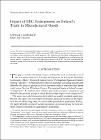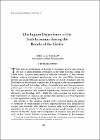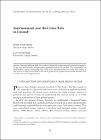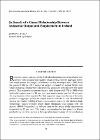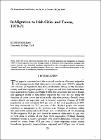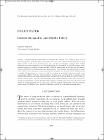Browsing Economic and Social Review Archive: Complete Collection 1969- by Title
Now showing items 338-357 of 920
-
Identification of cause and effect in simple least squares regression
(Economic & Social StudiesDUBLIN, 1973)Given data ( X , Yt, t=i, z, . . . , T, can we distinguish which variable is causal? -
Identification of individual aberrations in least squares regression
(Economic & Social StudiesDUBLIN, 1971)In single equation LS regression the common practice is. to test goodness-of- fit by the standard error o f estimate s and probable absence, of residual autoregression by the Durbin-Watson d, or the more recent count Of ... -
Identifying economically vulnerable groups as the economic crisis emerged
(Economic & Social StudiesDublin, 2010)A frequent refrain during recent debates on welfare cuts and tax increases has related to the need to ?protect the vulnerable?. However, it is far from clear that a consensus exists on which individuals or groups are to ... -
Identifying priorities for building distinct information societies
(Economic & Social StudiesDublin, 1997)The information society discussion to date has been dominated by vision statements from national governments and promotional campaigns by the major suppliers of information/communication hardware and software. They have ... -
Identifying the source of mean and volatility spillovers in Irish equities: a multivariate GARCH analysis
(Economic & Social StudiesDublin, 1998)This paper, using a multivariate VAR-GARCH analysis, examines the role of the UK stock market in the price behaviour of the ten largest Irish stocks. We identify the source of mean and volatility spillovers in Irish stocks ... -
Identity, collective beliefs, and the allocation of resources
(Economic & Social StudiesDublin, 2008)Humans are social creatures that interact in a number of different and at least partially independent social settings, such as work, home, social and political organisations, and church. In each setting one has an identity, ... -
Impact of EEC enlargement on Ireland trade in manufactured goods
(Economic & Social StudiesDublin, 1985)The study examines the likely impact on Ireland's trade in manufactures of the accessions of Greece, Portugal and Spain to the EECSITC3-digit trade data (for 1978-1983) for manufactures are used to compute two indices: ... -
Impact of EEC enlargement on Ireland trade in manufactured goods
(Economic & Social StudiesDublin, 1985)The study examines the likely impact on Ireland's trade in manufactures of the accessions of Greece, Portugal and Spain to the EECSITC3-digit trade data (for 1978-1983) for manufactures are used to compute two indices: ... -
Impact of lower preference votes on Irish parliamentary elections, 1922-1977
(Economic & Social StudiesDUBLIN, 1979)This paper examines the electoral impact of the counting and transfer of lower preference votes on Dail elections since 1922. The relationship between transfers and constituency size is assessed, and it is shown that a ... -
Import dependence of the Irish economy during decade of '60s
(Economic & Social StudiesDublin, 1978)Was there a movement to growing import dependence in the Irish economy during the 1960s? Why? These are the central questions for which answers will be sought in this paper. Various measures of import dependence will be ... -
Import protection as export promotion in oligopolistic markets with R & D
(Economic & Social StudiesDublin, 1991)Can import protection ever act as export promotion? One reason that this is an important question is that it has often been argued that import protection is an explanation of Japanese export success since the war. Yamamura ... -
Imprisonment and the crime rate in Ireland
(Economic & Social StudiesDublin, 2003)Between 1995 and 1999, the number of indictable crimes recorded in Ireland dropped by 21 per cent and the daily average prison population rose by 33 per cent. The Government has claimed that a causal relationship exists ... -
IMS, EMS, and the (n-1) problem
(Economic & Social StudiesDublin, 1989)Three types of exchange rate regimes predominate the present international monetary system (IMS): the managed float by industrialised countries, a fixed but adjustable peg inside the European Monetary System (EMS), and in ... -
In search of a causal relationship between industrial output and employment in Ireland
(Economic & Social StudiesDublin, 1989)Recently, many analysts of the Irish manufacturing sector have been concerned with an apparent negative relationship, between aggregate industrial employment and output in Ireland, that has developed since 1980. Over the ... -
In search of a causal relationship between industrial output and employment in Ireland: a comment
(Economic & Social StudiesDublin, 1989)John Fell has produced a stimulating paper which uses V A R methodology to address the issue of causal relationships between employment and output at both aggregate and disaggregated levels. Given the techniques employed, ... -
In-migration to irish cities and towns, 1970-71
(Economic & Social StudiesDUBLIN, 1982)Precis: Cities and towns played an important role in internal migration and immigration in Ireland in 1970-71. Gross migration rates were strongly related to estimates of the employment increases in the centres over the ... -
Income and wealth in The Irish Longitudinal Study on Ageing
(Economic & Social StudiesDublin, 2014)Between 2009 and 2011, data were collected under the first wave of The Irish Longitudinal Study on Ageing (TILDA). Over 8,500 people aged 50 and over and living in Ireland were interviewed about a wide range of topics ... -
Income inequality and public policy
(Economic & Social StudiesDublin, 2009)This paper briefly summarises the evidence that Ireland has a relatively high level of income inequality, which has been rather stable over time and reflects institutional legacies and choices made in the past. A comparative ... -
Income maintenance payments in Ireland, 1953-1971 - cyclical variations and long-term growth
(Economic & Social StudiesDUBLIN, 1974)Three contributions have appeared in recent issues of this Review on the topic of Ireland's social security payments viewed in relation to the growth of national income. The original Note by Geary clearly raised some very ... -
Income tax cuts and inflation in Ireland
(Economic & Social StudiesDublin, 1998)A two sector model of the Irish economy is used to analyse whether either temporarily or permanently deferring reductions in labour tax rates would cut inflation in the short run. If the deferral of tax cuts is seen as ...






